Elective Subject Selection Handbook
Year 9 & 10 2024



The educational vision of Loreto schools springs from the Gospel of Jesus Christ. When Mary Ward founded the Institute of the Blessed Virgin Mary (IBVM) in 1609, she recognised the critical difference that education could make to her troubled world, especially through the care and development of faith.
Offering girls the kind of education that would make them “seekers of truth and doers of justice” was innovative and controversial, as was her plan for the Institute to be self-governing, mobile and actively engaged in the work of the gospel. Grounded in Ignatian spirituality, she believed in the capacity of women as well as men to find God in the ordinary experience of human life. In her time it seemed that she fought a losing battle, culminating in the suppression of the Institute, her own imprisonment and the closing of the schools.
Nearly 400 years later, however, the spirit of Mary Ward continues to inspire us and Loreto schools are part of an international network of friendship. In 1875 Mary Gonzaga Barry brought the IBVM to Australia. Her
influence on primary, secondary and tertiary education was both lively and profound. She established schools across the country which provided a wide range of students with a balanced, happy yet challenging education that prepared them to exert a lasting influence on the emerging nation. Moreover, her initiatives to improve the quality of teacher training and inservice went far beyond Loreto. Now the Institute is active across Australia and in every continent, collaborating with others to bring the gospel to life in the church and in society. Education is seen as a vital part of this endeavour, a way of promoting full human growth and freedom.
This is our vision: that Loreto schools offer a Catholic education which liberates, empowers and motivates students to use their individual gifts with confidence, creativity and generosity in loving and responsible service.
Central Educational Advisory Board Australian Province of the Institute of the Blessed Virgin Mary.
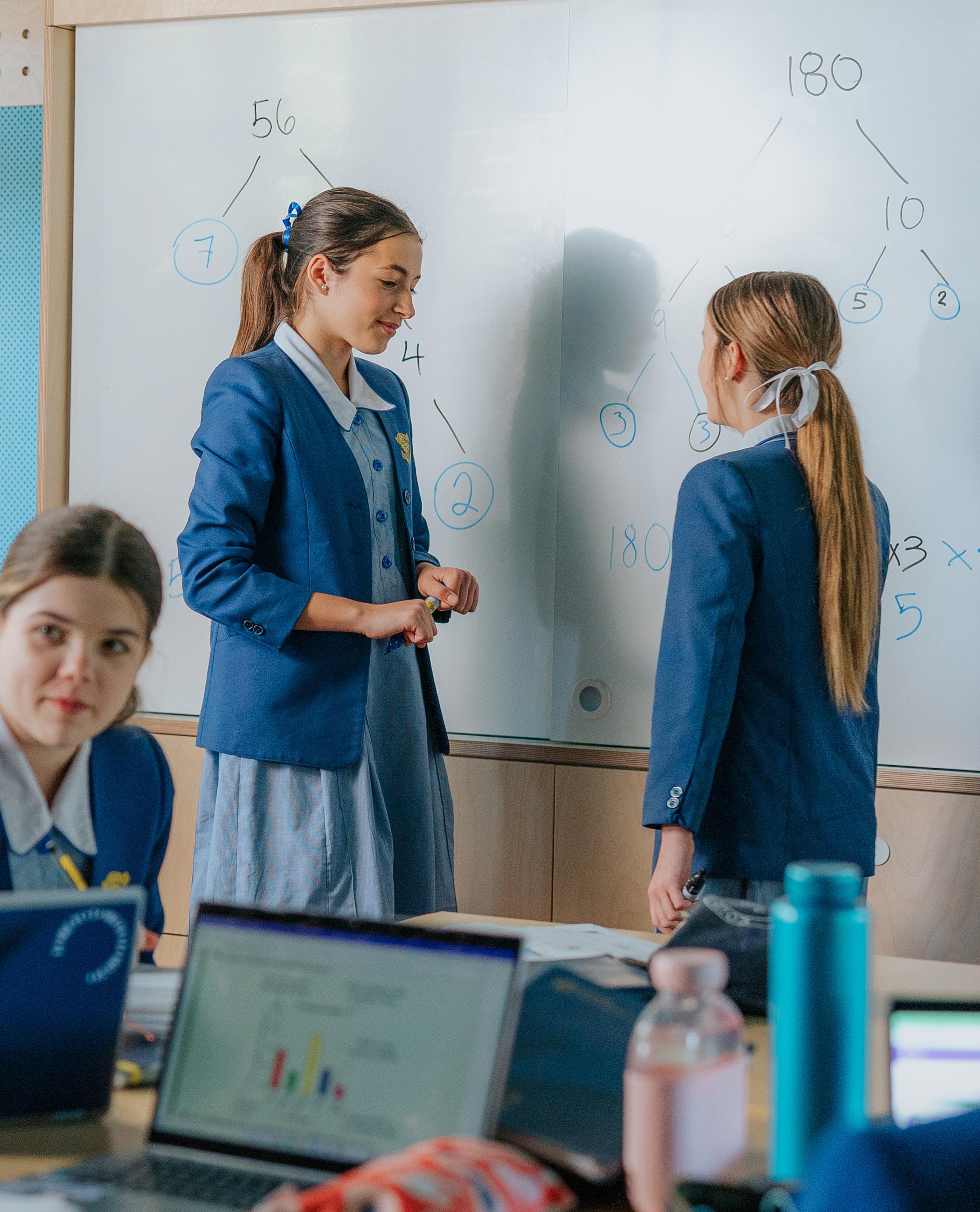
The Curriculum in Years 9 and 10 comprises some subjects that all students must study as well as a variety of subjects where students are able to choose. Students in Year 9 can select three subjects from the list below. In Year 10, students must study mandatory Australian History and Australian Geography which means they will only be able to carry two of their electives through into Year 10.
There are some exclusions in selection. These are:
• If a language is selected, it must be the language the student studied in Year 8
• If a student selects either Elective History or Elective Geography in Year 9, they are unable to study this in Year 10. They must study both the mandatory Australian History and Australian Geography. For this reason, students may not choose both Elective History and Elective Geography in Year 9.
• New Electives CANNOT be selected in Year 10. Only ONE elective can be dropped in Year 10. Two or three electives CANNOT be dropped and another two or three selected.
In Year 9 all students study a core curriculum consisting of the following courses:
• Religious Education
• English
• Mathematics
• Science
• Personal Development, Health & Physical Education
• Integrated Learning
• THREE electives
In Year 10, all students study a core curriculum consisting of the following courses:
• Religious Education
• English
• Mathematics
• Science
• Personal Development, Health & Physical Education
• Australian Geography
• Australian History
• Integrated Learning
• TWO electives
Apart from core subjects, there are very few subjects that require study in Years 9 and 10 for further study in Years 11 and 12. Only Languages and Music must be studied in Years 9 and 10 for study in Years 11 and 12, as a Continuers course. There are Beginner’s courses in both Music and Languages available for study in the Senior School.
Students should also choose subjects that will ensure they experience different skills and learning modes to add variety to the school day.
There are several criteria when choosing courses for Years 9 and 10.
• choose subjects that you are interested in and enjoy learning
• ensure that you keep a balance of subjects
• look to subjects where the student has demonstrated success
Be aware that subjects such as Visual Arts, Textiles Technology and Design & Technology have practical components. Choosing three practical subjects will make great demands on time.
In order to protect students from frustration and disappointment resulting from inappropriate subject choices, the school reserves the right to prevent students selecting subjects in Year 9 in which they have not demonstrated sufficient mastery in Year 8.
Loreto Normanhurst does not guarantee that classes will be formed in all courses that are offered.
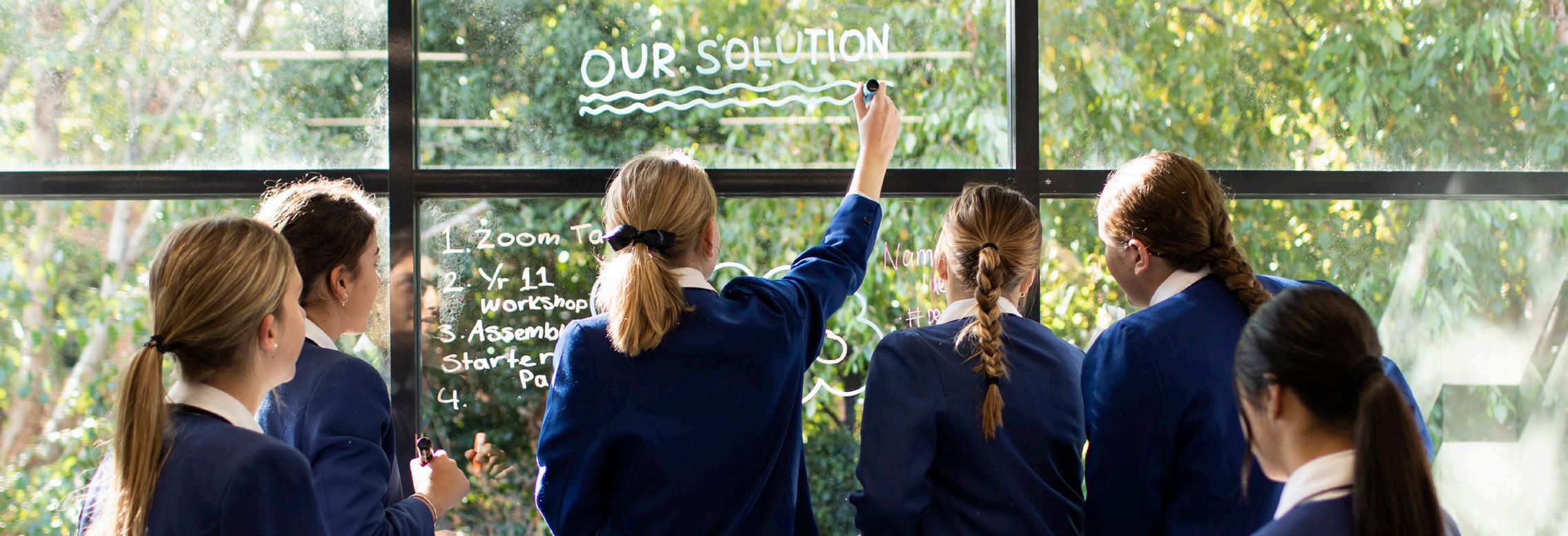
Aboriginal Studies
French
Agriculture Technology
Food Technology
Chinese Commerce
Computing Technology
Italian Dance
The Subject Selection website will be open on Wednesday 21st June 2023 for students to make their selections after considering all the information provided in the weeks prior.
Students will complete Subject Choices by Friday 28th July 2023.
It may be possible to change electives chosen for Year 9, 2023 if there is a place available in a class. Year 9 students generally will not be able to change their electives after Week 3 of Term 1, 2024.
Music Drama
Physical Activity and Sports Studies
Design and Technology
Textiles Technology
Elective Geography (Year 9 only)
Visual Arts
Elective History (Year 9 only)
Learning Essentials (by invitation)
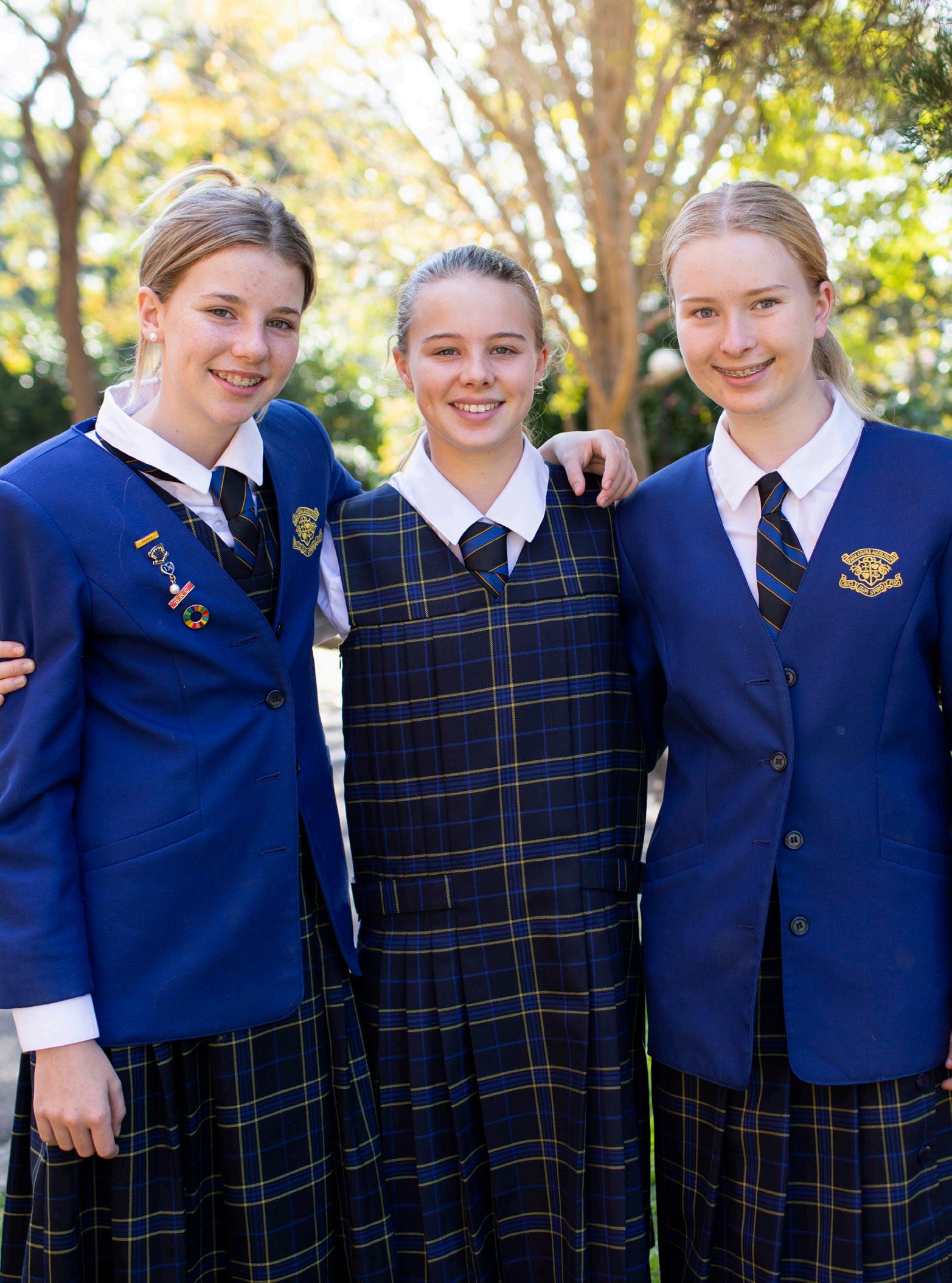
Education
Religious Education
Aboriginal Studies
English
Mathematics
Technology
Science
*Agriculture Technology
Studies of Religion I & II Studies of Religion II
Aboriginal Studies
*English - Standard
*English - Advanced
*English Ext.1
*Mathematics Standard
*Mathematics Advanced
*Maths Ext.1
*Biology
*Chemistry
*Physics
*Earth & Environmental Science
Studies of Religion I & II Studies of Religion II
Aboriginal Studies
*English - Standard
*English - Advanced
*English Ext.1 & Ext.2
*Mathematics Standard
*Mathematics Advanced
*Maths Ext.1 & Ext.2
*Biology
*Chemistry
*Physics
*Earth & Environmental Science
PDHPE
*Physical Activity & Sports Studies
*Dance
*Geography
*History
*Commerce
*PDHPE
*Community and Family Studies
* Dance
* Exploring Early Childhood
* Sport Life and Recreation
*Ancient History
*Modern History
*Business Studies
*Legal Studies
*Economics
*Geography
*PDHPE
*Science Extension & Sports
*Community and Family Studies
*Dance
*Exploring Early Childhood
*Ancient History
*Modern History
*History Ext.
*Business Studies
*Legal Studies
*Economics
*Geography Learning
Integrated Learning
*French
*Italian
*Chinese
*French Beginners
*French Continuers
*Italian Beginners
*Italian Continuers
*Chinese Beginners
*Chinese Continuers
*French Beginners
*French Continuers
*French Extension
*Italian Beginners
*Italian Continuers
*Italian Extension
*Chinese Beginners
*Chinese Continuers
*Music
*Visual Arts
*Drama
*Music 1
*Music 2
*Visual Arts
*Visual Design
*Ceramics
*Drama
*Music 1
*Music 2
*Music Ext.
*Visual Arts
*Visual Design
*Drama
*Computing Technology
*Food Technology
*Textiles Technology
*Design & Technology
*Enterprise Computing
*Food Technology
*Design & Technology
*Hospitality
*Textiles and Design
*Enterprise Computing
*Food Technology
*Design & Technology
*Hospitality
*Textiles and Design
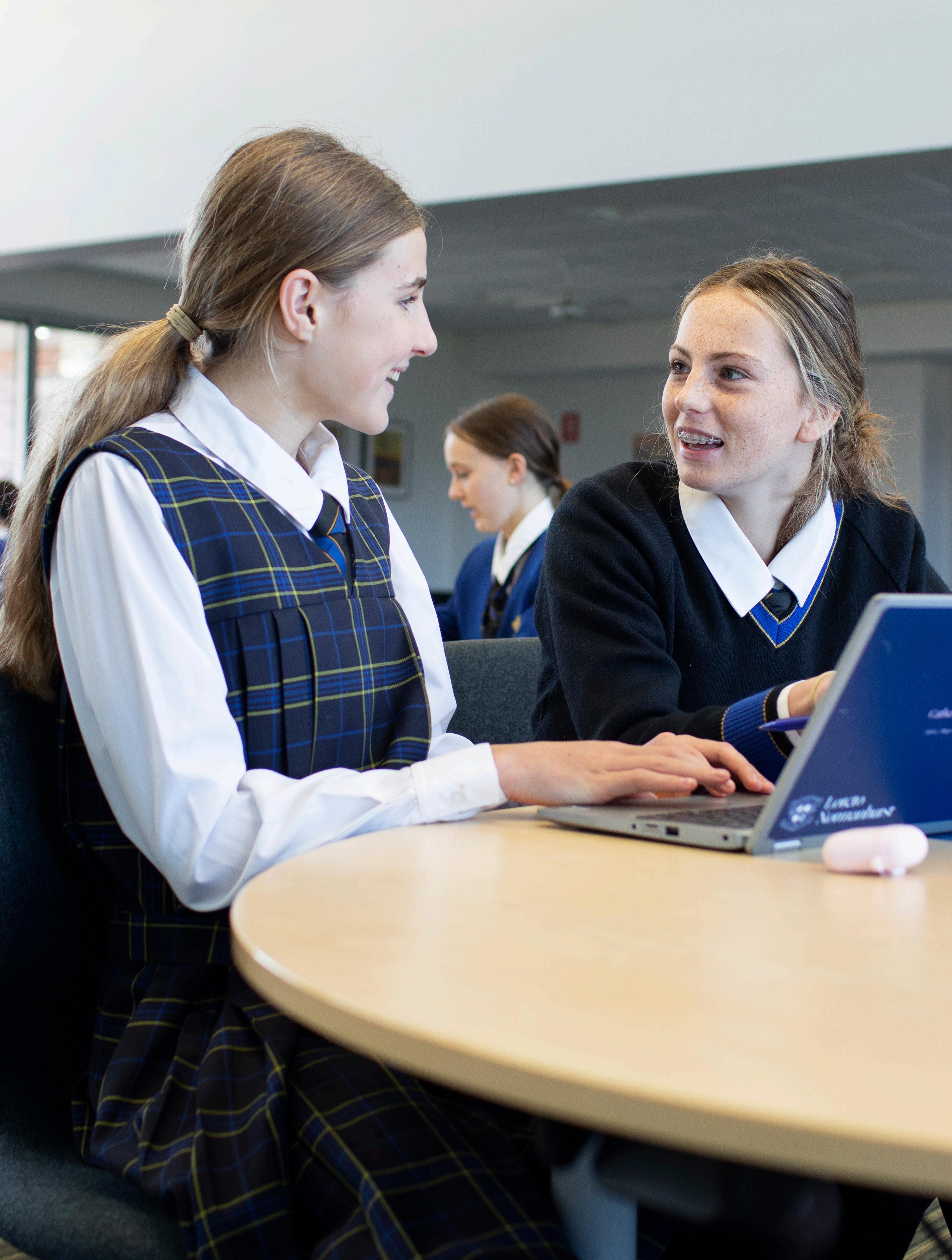
HOD Ms Jacinta Wells (Acting) Place of Course Agricultural Technology is an elective course that may be studied for 100 or 200 hours for Stage 5. It builds on the knowledge, skills and experiences developed in the Technology (Mandatory) Years 7–8 Syllabus.
Course Description
Agriculture contributes significantly to Australia’s economic, social and cultural development, influencing Australia’s prosperity through investment, employment of skilled workers, consumption of products from other sectors of the economy, and export of raw products and processed goods.
Aims of this course
• To develop knowledge and understanding of agricultural enterprises and the practices and skills required in producing plant and animal products
• To develop skills in the effective management of sustainable production and marketing practices that are environmentally and socially responsible
Course Content
Concepts studied include
• Plant and animal breeding
• Caring for plants and animals
• Ecology and sustainability in agriculture
• Role of agriculture in the economy and society
• Marketing and management
• Animal welfare and Occupational Health and Safety of workers
Practical Component
Students will spend approximately half of the course time on practical experiences related to the chosen enterprises, including
• fieldwork,
• small plot activities,
• laboratory work and visits to commercial farms and other parts of the production and marketing chain.
The skills of designing, investigating, using technology and communicating will also be developed over the period of the course.
Students will learn to identify hazards and apply risk management strategies when using chemicals, tools and agricultural machinery, when handling animals and performing animal and plant husbandry procedures.
Year 9
• Egg Production
• Vegetable Production
• Sugar Production
Year 10
• Mushroom Production
• Lamb and Wool Production
• Hydroponics
HOD Ms Jacinta Wells (Acting)
Place of Course
Aboriginal Studies is an elective course that may be studied for 100 or 200 hours for Stage 5.
Aboriginal Studies provides students with the opportunity to gain knowledge and understanding of Aboriginal Peoples of Australia, their cultures and lifestyles. Students are able to develop an appreciation of Aboriginal identity and experiences – an appreciation which acknowledges and addresses racism existing in Australian society. Students have the opportunity to develop an appreciation of the unique value of Aboriginal Peoples and their cultures to Australian identity. Students will work with a variety of Aboriginal Communities and People including spending time on the Far North Queensland Experience and Homelands Immersion hearing from Aboriginal Elders and learning about Aboriginal Culture.
Concepts studied include, but not limited to:
• Aboriginal Identities
• Aboriginal Peoples and the Visual Arts
• School-Based Option: Aboriginal Communities of Far North Queensland
• Aboriginal Peoples and the Media
• Aboriginal Film and Television
• Aboriginal Peoples and Sport
• Aboriginal Autonomy
• Aboriginal Enterprises and Organisations
The Year 9 and Year 10 course is a continuing course and may only be studied by students who have completed the Year 8 course.
Chinese is currently spoken by over 1 billion people around the world, about one fifth of the global population. In addition to the People’s Republic of China and Taiwan, Chinese is also spoken in the Chinese communities of Indonesia, Thailand, Malaysia, Singapore, Brunei, the Philippines, and Mongolia.
China is the second largest economy in the world and Australia’s largest trading partner. Many Australian companies have long-term investments there and business leaders are looking for people who can speak Mandarin Chinese and who can operate successfully in a Chinese cultural context. In December 2015, the ChinaAustralia Free Trade Agreement (ChAFTA) has entered into force, indicating that there will be increasing opportunities for employment and business in all areas.
Students will listen to, speak, read and write Chinese in a variety of topics. The course will incorporate audio visual materials, online activities, songs and language games to allow students to interact with each other and to work at their own pace. Through the study of the language, students will also learn Chinese customs and traditions which will help them to develop a more thorough understanding of the country and the people.
The topics studied for Chinese will be:
• Why are you always so busy?
• Birthday party
• How is the weather?
• My FNQ Experience
• Let’s hang out
• My studies and job aspirations
• Leisure time and getting around town
• Birthday and Festival celebrations
• Health and sickness
Commerce provides the knowledge, life skills, understanding and values that form the foundation on which young people make sound decisions on consumer, financial, business legal and employment issues. It develops in students an understanding of commercial and legal processes and competencies for personal financial management. Central to the course is the development of an understanding of the relationship between consumers, businesses and governments in the overall economy.
Year 9
• Consumer and Financial Decisions –Students learn to identify and research issues that individuals encounter when making consumer and financial decisions.
• Employment and Work FuturesStudents invetigate the contribution of work to individuals and society and the changing nature of work.
• Promoting and selling – Students investigate the promotion of goods and services including social, ethical and environmental considerations.
• Running a Business – Students investigate how entrpreneurial attributes and dispositions contribute to business success; and examine the considerations for planning and running a business through the $20 Boss Social Enterprise Project.
Year 10
• Law and Society and Political Involvement – Students develop an understading of how laws affect individuals and groups, and regulate society, and how individuals and groups participate in the democratic process.
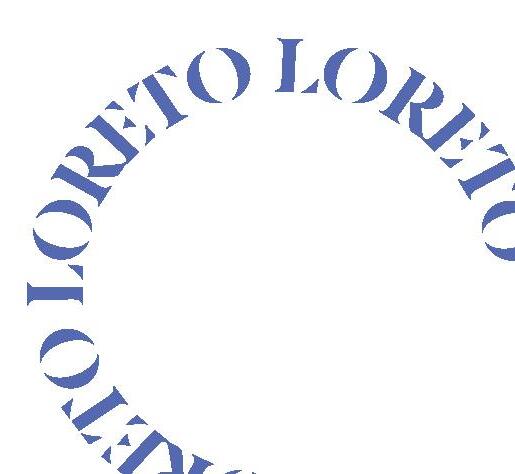
• The Economic and Business Environment – Students develop an understanding of the importance and features of the economic environement, including markets.
• Law in Action – Students investigate a range of situations in which individuals may come in contact with the law.
• Travel – Students learn how to plan for travel and how to solve problems encourntered when travelling.
HOD Mrs Rebecca Hill Place of Course
Students electing to study Food Technology in Year 9 and 10 are required to complete six to eight focus areas within the units they study. Through the study of Food Technology students will develop the ability to design, produce and evaluate solutions to situations involving food. The skills that the students gain are transferable to other study, work and life contexts that students may encounter.
In Computing Technology students develop skills in the specific application of computing technologies to develop digital solutions applicable to a range of industrial, commercial and recreational contexts.
Computing Technology focuses on computational, design and systems thinking. It also develops data analysis and programming (coding) skills. The knowledge and skills developed in the course enable students to contribute to an increasingly technologyfocused world.
Students have opportunities to develop skills in analysing data, designing for user experience, connecting people and systems, developing websites and apps, building mechatronic systems, and creating simulations or games. Students use hardware and software to manage and secure data. They also investigate the social, ethical and legal responsibilities of using data as creators of digital solutions while considering privacy and cybersecurity principles.
Students explore the impact of innovations in computing technology on society and the environment. They develop skills using a range of hardware and software applications, including multimedia, digital media, virtual and augmented realities, gaming, graphical data and visualisations, networks, and devices.
Students will learn about food through the following focus areas:
• Enterprise information systems: Modelling networks and social connections
• Enterprise information systems: Designing for user experience
• Enterprise information systems: Analysing data
• Software development: Building mechatronic and automated systems
• Software development: Creating games and simulations
• Software development: Developing apps and web software
The aim of the Dance Syllabus is for students to experience, understand, value and enjoy dance as an artform through the interrelated study of the performance, composition and appreciation of dance.
Dance involves the development of physical skill as well as aesthetic, artistic and cultural understanding. Learning in dance and learning through dance enables students to apply their own experiences to their study of dance. Students learn both movement principles and stylised techniques. The development of creativity, imagination and individuality is emphasized equally with knowledge of theatre dance.
Course Content
In Stage 5, Dance content is integrated study and consists of:
• The practices of performance, composition, and appreciation
• The elements of dance
• Dance as an art-form
Year 9
• Why do we dance?
• Safe dance practices
• Deconstructing Dance
• Improvisation and Structuring of Dance
• History of Dance
Year 10
• Musical theatre in Australia
• Aboriginal Dance
• Modern Dance Pioneers
• Dance Film
The Drama course is a means of assisting students in personal and social growth, allowing them to develop problem solving through an exposure to a greater variety of learning styles. This involves developing skills that would be useful across varied curriculum areas with application to numerous future vocational opportunities.
Elective Drama for Years 9 and 10 provides students with practical and theoretical experiences which can assist students to develop the following skills:
• Communication skills (visual, written and oral),
• Collaboration and negotiation
• Problem solving
• Critical thinking and analysis
• Emotional intelligence
• Self and peer evaluation
Year 9
• Improvisation and Theatresports
• Playbuilding
• Commedia dell’Arte
• Script in Performance - Pantomime
Year 10
• Shakespeare – Artist in Residence Program
• Scripted Drama and the Actor’s and Director’s Toolbox
• Protest/Political Theatre
• Playbuilding and Monologues
These areas of study are comprised of 60% practical and 40% theoretical lessons, with assessment tasks consisting of performance, practical workshops, short and extended written responses, directorial interpretation, creative movement, narrative script analysis, research and logbook recording and reflection.
HOD Mrs Rebecca Hill Place of Course
The design projects and focus areas will be selected based on the interests of the students and the teacher. Students will build on previous skills and develop a range of skills through a variety of design projects. Students undertaking the 200- hour course are required to complete a minimum of three focus areas and four to eight units of work.
Course Fee: Year 9: $100 Year 10: $100
Course Description
Design and Technology is a subject devoted to creating products as solutions to identified needs. It is a course that develops a student’s ability for innovative and creative thought through the planning and production of design projects related to real-world needs. Through the study of Design and Technology students will investigate existing solutions, analyse data and information and generate, justify and evaluate ideas.
Design and Technology involves designing, producing and evaluating quality designed solutions. Students develop an appreciation of the impact of technology on the individual, society and the environment through the study of the past, current and emerging technologies. They will also explore ethical and responsible design through the study of design and the work of designers.
Students engage in a range of practical activities during the development of a design project. Students will experiment with tools, materials and technologies to manage and produce prototypes, products and solutions to identified needs and problems.
Course Content
Core Content
Core content is divided into areas that must be integrated when developing units of work. The areas are:
• A holistic approach
• Design processes
• Activity of designers
Focus Areas:
The focus areas of design provide the context for designing, producing and evaluating products. The focus areas in Design and Technology are:
• Agriculture
• Digital Technologies
• Engineered Systems
• Information and Communication Technologies
• Material Technologies
Geography develops a wide range of skills such as gathering, organising and evaluating geographical information from a variety of sources, including fieldwork. Following on from the mandatory Geography course, in Years 7/8 (Stage 4 – People, Places, Environments and Management), students have the option of consolidating that learning in Year 9 with an elective Geography course, before undertaking the mandatory Geography course in Year 10.
The study of Geography aims to stimulate students’ enjoyment of and interest in the interaction of the physical and human environments. Students achieve this as they develop student knowledge, understandings, skills, attitudes and values and engage in the community as informed and active citizens.
Year 9 with an elective Geography course, before undertaking the mandatory Geography course in Year 10. This aims to stimulate students’ enjoyment of and interest in the interaction of the physical and human environments. Students achieve this as they develop student knowledge, understandings, skills, attitudes, and values and engage in the community as informed and active citizens.
The focus areas that will be studied are:
• True Cost of Fashion (school-developed option) – an exploration of the environmental, social and economic costs of the fashion industry
• Political Geography - the nature and distribution of political tensions and conflicts, and strategies towards effective resolutions
• Physical Geography - Students study the physical world and its workings, including formation of continents, landforms, climate and weather.
• Australia’s Neighbours – A study into what are the issues that neighbouring countries are facing currently.
• Oceanography - The features and importance of the world’s oceans and issues associated with them.
The study of history has value for all students. It contributes to an understanding of today’s world and provides a range of tools and methods for analysing the complex events and concepts that have shaped our world over time. The critical study of documentary material in Years 9 and 10 develops in students a questioning approach to contemporary problems and their solutions.
This course aims to not only present highly engaging historical content but also build essential skills required for the study of senior history. These skills include analysing and critiquing sources (examining bias, reliability and usefulness), research skills, critical and conceptual thinking, building sophisticated written and verbal arguments, developing instinctual trust in original and unique ideas, and writing skills.
The History Course for Year 9 provides students with an opportunity to examine ancient, middle and modern history, as well as experience an introduction into historiography and the ways in which history is constructed.
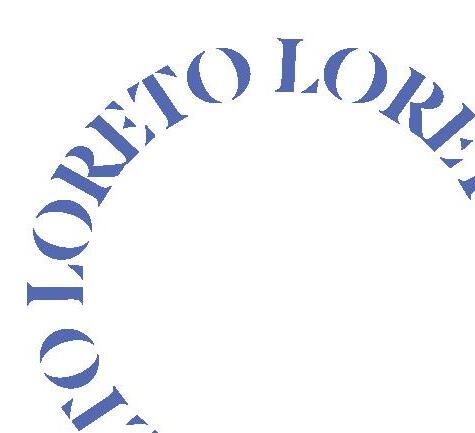
Topics include:
• This is Sparta! (and Athens!): A Study of Classical Greece (500-400 BCE).
• The Medici: Godfathers of the Italian Renaissance (1400-1527) (includes a guest lecture from university academic and Renaissance specialist, Dr Nicholas Baker)
• Historical Debates: Causes of the US Civil War and the importance of Slavery. A Deep-Learning project that debates the true origins of the US Civil War.
• The Failed Experiment: The Weimar Republic and the rise of the Nazi Party in Germany (1919-33). It includes a site study and visit to the Sydney Jewish Museum to examine the rise of anti-Semitism during this period of German history).
• Alternative and Popular History: How do films, computer games, board games and other media construct and present history?
Place of Course
The Year 9 and 10 course is a continuing course and may only be studied by students who have completed the Year 8 course.
French is spoken by approximately three hundred million people living in over 49 different countries. French is an important language in most international organisations and multi-national companies. Knowledge of French is a soughtafter skill in the international business community and is a key cultural resource for Australia’s engagement in the Pacific.
The study of French provides students with the opportunity develop their intercultural understanding and primes them to fully embrace global citizenship. Many universities now offer a range of degrees where units of French can be studied in French Universities as part of the Australian degree.
Students will listen to, speak, read and write French in real-life situations. They will gain greater precision in actual language use through increasing mastery of the grammatical system.
Students will also be exposed to a variety of other resources that reflect French language and culture. They will study articles from French magazines, songs, drama and films and will use a variety of ICT resources.
The study of French provides avenues for personal expression, access to an extended range of recreational activities and enhances employment prospects.
The topics studied for French will be:
• My week
• On Holidays
• My FNQ Experience
• At the shops
• Daily routine
• Making plans and going out
• Relationships
• Exchange
HOD Mrs Rebecca Hill Place of Course Students electing to study Food Technology in Year 9 and 10 are required to complete six to eight focus areas within the units they study. Through the study of Food Technology students will develop the ability to design, produce and evaluate solutions to situations involving food. The skills that the students gain are transferable to other study, work and life contexts that students may encounter.
Course Fee: Year 9: $130 Year 10: $130
Course Description
Food Technology is a course devoted to the investigation and practical experience of food. The study of Food Technology provides students with a broad knowledge of food properties processing, preparation, nutritional considerations and consumption patterns. The importance of hygiene and safe work practices, together with legislation in relation to the production of food is also a focus of the Food Technology course.
The aim of the Food Technology course is to actively engage students in learning about food in a variety of settings, enabling them to evaluate the relationships between food, technology, nutritional status and quality of life. Students will develop food-specific skills, which can be applied in a range of contexts enabling students to produce quality food products.
The Australian Food Industry is growing in importance, providing numerous employment opportunities and increasing the relevance of Food Technology for the individual and society. There are increasing community concerns about food issues, including hygiene and safety, nutritional claims and the nutritional quality of food, genetic engineering, functional food and the environmental impact of social justice and food production processes. The study of Food Technology will allow students to explore food-related issues through a range of theoretical and practical experiences, allowing them to make informed and appropriate choices with regards to food.
Practical lessons occur once per week and activities can include taste testing of new products, case studies on nutrition, preparation of food recipes, planning menus for events and preparing specific menu items utilising a variety of preparation equipment.
Course Content
Students will learn about food through the following focus areas:
• Food in Australia
• Food Selection and Health
• Food for Special Occasions
• Food Equity
• Food Service and Catering
• Food Trends
• Food Product Development
• Food for Specific Needs
Place of Course
The Year 9 and 10 course is a continuing course and may only be studied by students who have completed the Year 8 course.
Italian is one of the most widely spoken languages in Australia and thus opportunities exist for students to hear and use the language in real-life situations. It is, therefore, a very appropriate European language for study in Australian schools. A knowledge of Italian also provides direct access to understanding Italian culture which has made a significant contribution to contemporary Australian society.
Many universities now offer a range of degrees where units of Italian can be studied in Italian universities as part of the Australian degree. This gives students an extra advantage when seeking employment. Italian civilisation is rich in history, literature, philosophy and art.
Students will listen to, speak, read and write Italian in real life situations. They will gain greater precision in actual language use through increasing mastery of the grammatical system. Students will also be exposed to a variety of other resources that reflect Italian language and culture: magazines, songs, drama and films and they will use a variety of ICT resources.
The topics studied for Italian will be:
• My week
• On Holidays
• My FNQ Experience
• At the shops
• Telling stories about past events
• What will I do in the future?
• Using technology and looking after the environment
The aims of this course are:
• To build musicianship skills and understanding of the concepts of music through a study of diverse styles and genres, reflecting real world cultural musical contexts.
• To perform music as a tool of communication and self-expression.
• To develop critical thinking and creative skills through composing original works.
• To develop skills that can lead to further study of music.
Students learning an instrument or voice are given opportunities to use and develop their performance skills further if they choose to study elective music in Years 9 and 10.
This is achieved through the learning experiences of performing, composing and listening, integrating a study of the following concepts:
• Pitch
• Duration
• Tone Colour
• Texture
• Structure
• Dynamics & Expressive Techniques
A wide range of topics including rock and popular music, music recording and sound production, music of a culture, art music topics (Baroque/Classical period) and jazz, is explored throughout the duration of the course.
Students taking elective music are encouraged to study an instrument or voice through private tuition so that they can fully engage in the wide range of practical activities that are included in the course. Students prepare individual performances for class tasks, elective concert evenings and work collaboratively in class ensemble projects including rock bands. In addition to class performance, students are encouraged to take part in at least one extra-curricular musical activity, such as chamber strings, choir or symphonic wind ensemble.
Students learn to improvise ideas, compose for a variety of traditional orchestral, vocal and digital tone colours. Students learn to record layers of sound and engage in the skills needed to mix and arrange sound layers as well as notating their original compositions using music technology software including Noteflight, Sibelius, Soundtrap and Studio 1 DAWs.
Students learn about the way different concepts are used in many different styles and listen to a wide range of music that helps them appreciate and understand stylistic differences.
HOD Ms Sandra Cunningham Place of Course N/A
Physical Activity and Sports Studies incorporates a wide range of lifelong physical activities, including recreational, leisure and adventure pursuits, competitive and noncompetitive games, individual and group physical fitness activities and the use of physical activity for therapy and remediation.
This subject promotes the concept of leaning through movement. Many aspects of the course can be explored through participation in selected movement applications in which students experience, examine, analyse and apply new understanding. Students who study this course are encouraged to specialise and study areas in depth, to work towards a particular performance goal, pursue a formal qualification or examine an issue of interest related to the physical, emotional, social, cultural or scientific dimensions of physical activity and sport.
The content is organised in modules within the following three Areas of Study:
• Foundations of Physical Activity
• Physical Activity and Sport in Society
• Enhancing Participation and Performance.
Year 9
• Physical Fitness
• Issues in Sport
• Nutrition and Physical Activity
• Coaching
Year 10
• Event Management
• Body Systems and Energy for Physical Activity
• Technology, Participation and Performance
• Enhancing Performance: Strategies and Techniques
HOD Mrs Rebecca Hill Place of Course
Students undertaking the 200-hour course will complete a minimum of four units of work, covering a minimum of three focus areas.
Students will produce a textile item for each unit of work completed, thereby developing practical skills in designing, producing and evaluating. They will learn to design, produce and evaluate textile projects over a range of areas. Design ideas and experimentation are documented in a folio to communicate evidence of the processes of designing, producing and evaluating.
Course Fee: Year 9: $100 Year 10: $100
The aim of this course is to develop confidence and proficiency in the design, production and evaluation of textile items. The study of Textiles technology provides students with knowledge of properties, performance and use of textiles. Students will explore fabrics, yarns, fibres and colouration. They will examine historical, cultural and contemporary perspectives on textile design. Students will actively engage in learning about the properties and performance of textiles, textile design and the role of textiles in society.
Students will investigate the work or textile designers and make judgements about the appropriateness of design ideas, the selection of materials and tools and the quality of textile items. Textiles Technology will contribute to the overall education of students by enabling them to confidently use a range of technologies and create an awareness of related career pathways and leisure pursuits. Through completing textile projects students are provided with opportunities to be creative, independent learners and to explore functional and aesthetical aspects of textiles.
Project work forms the basis of every unit of work. Teachers will select a focus area as a starting point for the development of a unit of work. Appropriate content from project work and areas of study is integrated in creating units of work that meet student needs and interests. The focus areas provide the context through which the three areas of study; Design, Properties and Performance of Textiles, Textiles and Society are covered.
Focus Areas of study include:
• Apparel
• Furnishings
• Costume
• Textile Arts
• Non- Apparel
HOD Mrs Monica Boardman Place of Course Course Fee: Year 9: $100 Year 10: $120
The course is structured around two main components: Artmaking 60% the handson making of artworks, through imagination and guided instruction of skills, and Critical Historical studies 40%, learning about how and why artists make artworks. The Visual Arts course promotes creativity and offers insights into the world and its people by examining and studying artworks as transmitters of cultural ideas. It promotes, skills development and learnt techniques, problem solving, creative thinking skills and offers students an intellectual/emotional outlet for self-expression during school years and beyond.
The Visual Arts course provides students with ongoing opportunities to:
• develop skills in artmaking practices and experiment with a variety of art forms and techniques;
• extend their understanding and appreciation of artists’/crafts people/designers and their works in historical and contemporary contexts. This will include Australian art, including Aboriginal art, as well as works produced in other countries, regions, periods and cultures;
• complete a comprehensive study of contemporary art and design practices;
• critically analyse art/design and understand its use and application in contemporary society, as well as consider the ways artworks have value and meaning.
Year 9
• Drawing PortraitureLarge format pencil drawings Renaissance perspective
• PaintingBaroque small relief of everyday life painted using small brushes on irregular shaped boxes
• Sketch book and photos from FNQ Painting, drawing, photography
• Ceramics Hermannsburg Potceramic pot shaped like a large seed pod and designed to reflect the Australian landscape as inspired by FNQ
Year 10
• The Modernist artists of the 20th Century with focus on design, composition, colour and light
• Printmaking and drawing
• Protest Art students create a protest poster in response to a world issue, printmaking, drawing collage, scanning photo media
• Ghost Net Project - collaborative project, lino printing, ink, drawing, installation, mixed media, photo digital media
• Installation and exhibition of the Ghost Net Project installed within the walls of Loreto
Expressive forms available: Painting, drawing, ceramics, photography, Photoshop, multimedia, printmaking and etching, manipulated artworks using textiles and scanned images.
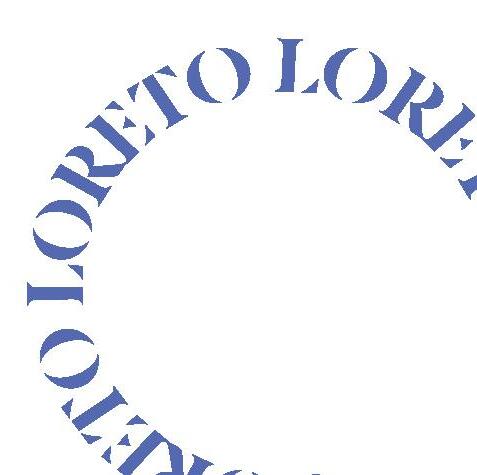
Learning Essentials is an alternative elective for students who may need some extra assistance with their learning or extra time to complete work due to their individual circumstances. Students work with a member of the Diverse Learning team in a small group setting where individual and group assistance is offered regarding planning and executing assessment tasks, organisational skills, goal setting and development of literacy skills.
As a result of small class sizes, the teacher is able to work in pairs or individually with each student in the class. The teacher models, guides and then encourages the students to work independently. This level of support is aimed at preparing students for stage 6 where they will be required to implement these work habits, study skills and strategies autonomously.
91-93 Pennant Hills Road
Normanhurst NSW 2076 Australia
www.loretonh.nsw.edu.au
enrolments@loretonh.nsw.edu.au
1800-LORETO
Year 9 & 10 2024